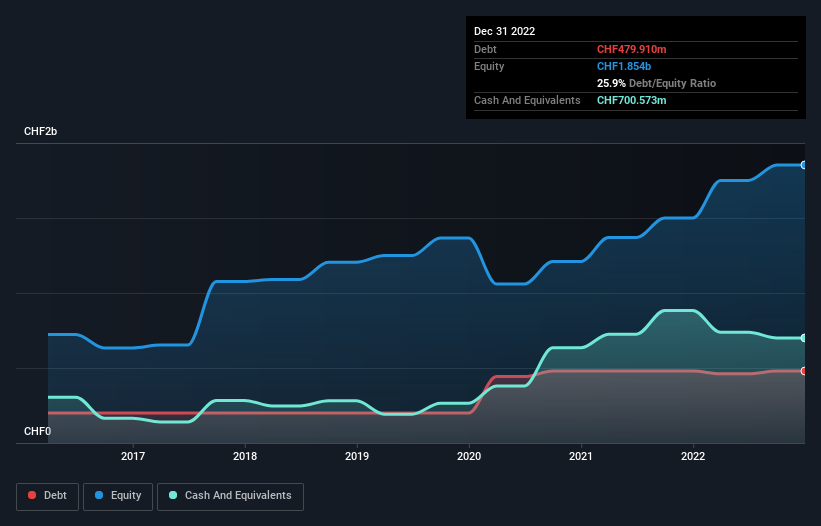- Switzerland
- /
- Medical Equipment
- /
- SWX:STMN
We Think Straumann Holding (VTX:STMN) Can Manage Its Debt With Ease

Howard Marks put it nicely when he said that, rather than worrying about share price volatility, 'The possibility of permanent loss is the risk I worry about... and every practical investor I know worries about.' When we think about how risky a company is, we always like to look at its use of debt, since debt overload can lead to ruin. We note that Straumann Holding AG (VTX:STMN) does have debt on its balance sheet. But is this debt a concern to shareholders?
When Is Debt Dangerous?
Debt is a tool to help businesses grow, but if a business is incapable of paying off its lenders, then it exists at their mercy. Ultimately, if the company can't fulfill its legal obligations to repay debt, shareholders could walk away with nothing. However, a more usual (but still expensive) situation is where a company must dilute shareholders at a cheap share price simply to get debt under control. Of course, the upside of debt is that it often represents cheap capital, especially when it replaces dilution in a company with the ability to reinvest at high rates of return. When we think about a company's use of debt, we first look at cash and debt together.
See our latest analysis for Straumann Holding
What Is Straumann Holding's Debt?
As you can see below, Straumann Holding had CHF479.9m of debt, at December 2022, which is about the same as the year before. You can click the chart for greater detail. But it also has CHF700.6m in cash to offset that, meaning it has CHF220.7m net cash.

How Healthy Is Straumann Holding's Balance Sheet?
Zooming in on the latest balance sheet data, we can see that Straumann Holding had liabilities of CHF972.1m due within 12 months and liabilities of CHF547.5m due beyond that. On the other hand, it had cash of CHF700.6m and CHF565.5m worth of receivables due within a year. So it has liabilities totalling CHF253.5m more than its cash and near-term receivables, combined.
Having regard to Straumann Holding's size, it seems that its liquid assets are well balanced with its total liabilities. So it's very unlikely that the CHF19.8b company is short on cash, but still worth keeping an eye on the balance sheet. While it does have liabilities worth noting, Straumann Holding also has more cash than debt, so we're pretty confident it can manage its debt safely.
Straumann Holding's EBIT was pretty flat over the last year, but that shouldn't be an issue given the it doesn't have a lot of debt. The balance sheet is clearly the area to focus on when you are analysing debt. But it is future earnings, more than anything, that will determine Straumann Holding's ability to maintain a healthy balance sheet going forward. So if you're focused on the future you can check out this free report showing analyst profit forecasts.
Finally, while the tax-man may adore accounting profits, lenders only accept cold hard cash. Straumann Holding may have net cash on the balance sheet, but it is still interesting to look at how well the business converts its earnings before interest and tax (EBIT) to free cash flow, because that will influence both its need for, and its capacity to manage debt. During the last three years, Straumann Holding produced sturdy free cash flow equating to 68% of its EBIT, about what we'd expect. This cold hard cash means it can reduce its debt when it wants to.
Summing Up
While it is always sensible to look at a company's total liabilities, it is very reassuring that Straumann Holding has CHF220.7m in net cash. And it impressed us with free cash flow of CHF220m, being 68% of its EBIT. So we don't think Straumann Holding's use of debt is risky. When analysing debt levels, the balance sheet is the obvious place to start. But ultimately, every company can contain risks that exist outside of the balance sheet. For instance, we've identified 1 warning sign for Straumann Holding that you should be aware of.
At the end of the day, it's often better to focus on companies that are free from net debt. You can access our special list of such companies (all with a track record of profit growth). It's free.
New: Manage All Your Stock Portfolios in One Place
We've created the ultimate portfolio companion for stock investors, and it's free.
• Connect an unlimited number of Portfolios and see your total in one currency
• Be alerted to new Warning Signs or Risks via email or mobile
• Track the Fair Value of your stocks
Have feedback on this article? Concerned about the content? Get in touch with us directly. Alternatively, email editorial-team (at) simplywallst.com.
This article by Simply Wall St is general in nature. We provide commentary based on historical data and analyst forecasts only using an unbiased methodology and our articles are not intended to be financial advice. It does not constitute a recommendation to buy or sell any stock, and does not take account of your objectives, or your financial situation. We aim to bring you long-term focused analysis driven by fundamental data. Note that our analysis may not factor in the latest price-sensitive company announcements or qualitative material. Simply Wall St has no position in any stocks mentioned.
About SWX:STMN
Straumann Holding
Provides tooth replacement and orthodontic solutions worldwide.
Flawless balance sheet with high growth potential.


